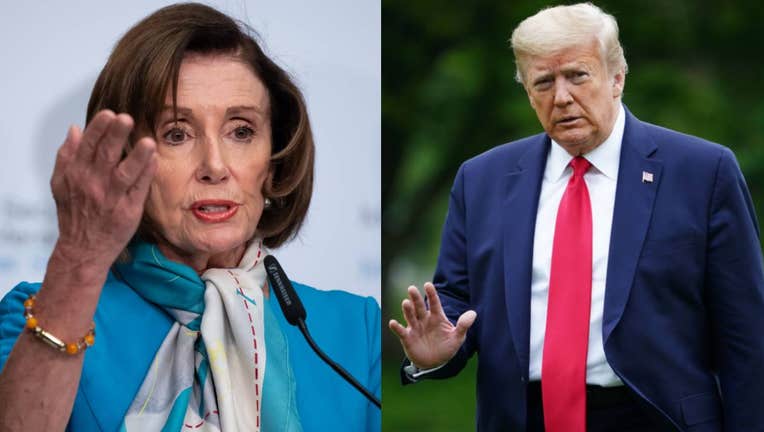Nancy Pelosi digs at Trump, calls president 'morbidly obese'

(Photos by Sven Hoppe/picture alliance via Getty Images and MANDEL NGAN/AFP via Getty Images)
House Speaker Nancy Pelosi, D-Calif., took a shot at President Trump's weight amid the revelation that he has been taking the anti-malaria drug hydroxychloroquine that he previously touted as a treatment for the coronavirus.
During an appearance on CNN on Monday night, Pelosi was asked if she was "concerned" about Trump's announcement that he had been prescribed the drug by the White House physician.
"As far as the president is concerned, he's our president and I would rather he not be taking something that has not been approved by the scientists, especially in his age group and in his, shall we say, weight group -- what is it, morbidly obese they say. So I don't think that's a good idea," Pelosi told CNN anchor Anderson Cooper before he moved on to another question.
Trump stoked a flurry of reaction Monday after revealing to reporters that he has been taking hydroxychloroquine to stave off the novel coronavirus, with many experts urging Americans to consult with doctors before taking such a step.
The president said he has been taking hydroxychloroquine and a zinc supplement daily "for about a week and a half now."
Trump has spent weeks pushing the drug as a potential cure for COVID-19, despite there being no consensus on its effectiveness or safety. Dr. Sean Conley, the president's physician, announced in a statement Monday night, "After numerous discussions he and I had about regarding the evidence for and against the use of hydroxychloroquine, we concluded the potential benefit from treatment outweighed the relative risks."
Still, many doctors urged Americans that their best sources for medical information are medical experts, not the president.
"You have to have a discussion with your doctor to decide if it is best for you," Dr. Janette Nesheiwat, a Fox News medical contributor, warned. "It is not going to be good for everyone but it may be beneficial and potentially life-saving for others."
Dr. William Schaffner, an infectious diseases specialist at the Vanderbilt Medical Center, went a step further. "I certainly would not recommend that people in the U.S. ask their physicians to prescribe hydroxychloroquine for the prevention of COVID," Schaffner told The Wall Street Journal. "Its use is entirely speculative."
Former Planned Parenthood President Dr. Leana Wen said there was "NO evidence for hydrochloroquine being effective in treatment of #covid19 or prophylaxis to prevent the disease."
She continued, "This medication has serious side effects. I am very concerned about @realDonaldTrump continuing to model behavior that could harm many Americans."
Fox News' Bradford Betz contributed to this report.
Get updates on this story at FOXNews.com
In order to protect yourself from a possible infection, the CDC recommends:
- Avoid close contact with people who are sick.
- Avoid touching your eyes, nose, and mouth.
- Stay home when you are sick.
- Cover your cough or sneeze with a tissue, then throw the tissue in the trash.
- Clean and disinfect frequently touched objects and surfaces using a regular household cleaning spray or wipe.
- Wash your hands often with soap and water for at least 20 seconds, especially after going to the bathroom; before eating; and after blowing your nose, coughing, or sneezing.
MAP: Worldwide interactive Coronavirus case data
Coronavirus (COVID-19)
How it spreads, symptoms, prevention, treatment, FAQ
https://www.cdc.gov/coronavirus
On CoronavirusNOW.com, you'll find extensive coverage about COVID-19, including breaking news from around the country, exclusive interviews with health officials, and informative content from a variety of public health resources.
Symptoms for coronavirus COVID-19 include fever, coughing, and shortness of breath. These, of course, are similar to the common cold and flu.
Expect a common cold to start out with a sore or scratchy throat, cough, runny and/or stuffy nose. Flu symptoms are more intense and usually come on suddenly, and can include a high fever.
Symptoms of COVID-19 may appear more slowly. They usually include fever, a dry cough, and noticeable shortness of breath, according to the World Health Organization. A minority of cases develop pneumonia, and the disease is especially worrisome for the elderly and those with other medical problems such as high blood pressure, obesity, diabetes, or heart conditions.
RELATED: Is it the flu, a cold or COVID-19? Different viruses present similar symptoms
Right now there's one big difference between flu and coronavirus: A vaccine exists to help prevent the flu and it's not too late to get it. It won't protect you from catching the coronavirus, but may put you in a better position to fight it.
To protect yourself, wash your hands well and often, keep them away from your face, and avoid crowds and standing close to people.
And if you do find yourself showing any of these flu or coronavirus symptoms - don't go straight to your doctor's office. That just risks making more people sick, officials urge. Call ahead, and ask if you need to be seen and where.

